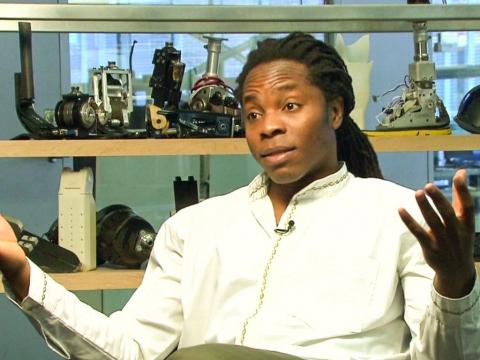By Saio Marrah
Minister of Basic and Senior Secondary Education (MBSSE), Dr. Moinina David Sengeh, has defended the Bio administration’s education policy, amidst concerns among lawmakers.
Dr Sengeh appeared before the House of Parliament on Tuesday, 8th December, after he was summoned by the lawmakers who expressed concern over the poor performance of Sierra Leonean students in this year’s West African Senior Secondary School Certificate Examination (WASSCE).
The lawmakers wanted to know why, despite the huge amount of money spent by the government in its Free Quality Education programme, the performance of the candidates was so bad.
Sengeh was put on the spot over statistics he himself published concerning the WASSCE results for Sierra Leone. The data revealed that only 4.5 percent of the Sierra Leonean candidates had university entry requirement. Sengeh said his presentation was taken out of context, noting that the number he gave was meant for people who seek university degree, which is different from the general passmark for entry for other courses.
He explained that passes are within the range of A1 to E8, while credit falls between A1 to C6, with failure being only F9. The minister further noted that university entry requirement depends on one’s choice of university.
Sengeh used his presentation to the lawmakers to plead with them not to politicized education.
“WASSCE, which is the West African Senior School Certificate Examination, is an international examination in Gambia, Ghana, Liberia, Nigeria and Sierra Leone, and WAEC, which is the West African Examination Council, is the entity that conducts the WASSCE exams. WAEC is governed in Sierra Leone based on the WAEC Act of 1954,” he said.
He added: “It is a single grading score that all these countries use. A pass is when a student achieves in the WASSCE exam anywhere between A1 and E8. A credit is when a student achieves between A1 and C6. Fail is when somebody gets F9.”
But a member of the main opposition All People’s Congress (APC), Hassan Abdul Sesay of Constituency 050 from Tonkolili District, who is also the Chief Whip of the party, put it to the minister that what they as MPs considered as a pass in the WASSCE is when one gets a university requirement.
In response to that submission, Minister Sengeh stressed that universities have different programmes, noting that besides degree, there are diploma, certificate and short term courses, with set standards for entry. He emphasized that university degree programmes are not the only assurance of one’s success, while making reference to Bill Gate, one of the richest people in the world, whom he said had no university degree but still made a remarkable achievement.
Dr Sengeh went on to say that WASSCE serves as the entrance to tertiary or technical learning institutions from senior school, but not limited to university.
The Basic Education minister also informed the lawmakers that the total number of pupils that pass the WASSCE exams is on the increase, noting that this is not prominently felt because of the increase in the number of enrolment due to the free quality education. He said even though the percentage of those who attempted the exams showed that the university requirements is very low, but that it is higher in number compared to what obtained in past exams.
The minister cited past records in 2014 and 2016, which showed that 30,000 and 35,000 people attempted the exams those years, respectively. He said the introduction of the FQE led to the multiplication of the student number to 102, 000 in 2019 and 120,000 in 2020.
According to him, Sierra Leone is rated as the country with the largest investment in the educational system in the world, pointing out that the FQE is the most prosperous programme in the country ever. This, he said, is because everyone has benefited from the said programme in the country and that every Sierra Leonean embraced the FQE system.
Sengeh added that the MBSSE has expanded in teacher training and teacher encouragement, noting that the ministry has established a curriculum of syllabus for both civic and basic education, which he said was not in existence in previous regimes. Sengeh also noted that not all the WASSCE results for this year have been published, suggesting that it the data could further positively improve.
The Speaker of Parliament, Dr. Abass Bundu, told the minister that they would ask him to come to parliament when all the results will have been published.
Copyright © 2020 Politico Online








